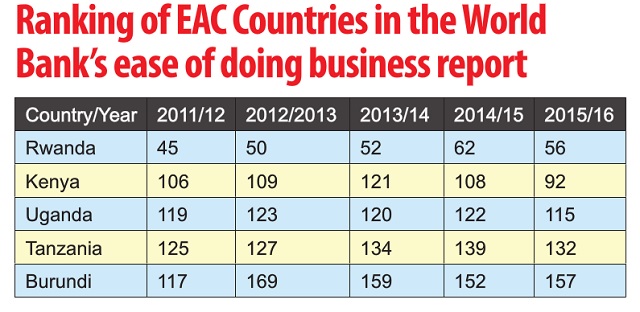
Better business climate
Uganda’s ranking in the 2017 World Bank’s Ease of Doing Business has improved by seven places, a development that shows that ongoing business environment reforms being implemented by the government are starting to bear fruit.
Uganda now ranks 115th out of the 190 assessed economies, which is a step up by seven places from the previous year while in Sub-Saharan Africa, the country ranks 12th out of 48 economies. Within the East African Community, Uganda is in third place behind Kenya and Rwanda.
Uganda recorded improvements in six of the ten indicators that the World Bank uses to assess the economies. The Doing Business report, which was launched on Oct. 25 in Washington, US, recognises Uganda among the 29 economies that implemented reforms in three or more of the ten indicators.

The report, released under the theme, “Equal Opportunity for All,” is the 14th in a series of reports produced by the World Bank, and it basically investigates the regulations that enhance business activity and those that constrain it. The goal of the Doing Business series is to provide objective data for use by the governments in designing sound business regulatory policies.
The ten indicators upon which economies are gauged include; starting a business, dealing with construction permits, getting electricity, registering property, getting credit, protecting minority investors, paying taxes, trading across borders, enforcing contracts and resolving insolvency.
Uganda made starting a business easier by eliminating the requirement to commission and file a declaration of compliance when incorporating a company, thanks to the Business Licences (Miscellaneous Repeals) Act, which entered into force on July 1, 2015.
Uganda also made paying taxes easier by eliminating a requirement for tax returns to be submitted in paper copy following online submission. This reform also relieved the administrative burden on businesses filing corporate tax and VAT returns.
Carolyn Ndawula, the programme manager for trade and competitiveness at the World Bank Country Office in Kampala, noted that Uganda’s improvement by seven places was because of Uganda Revenue Authority (URA) and the Uganda Registration Services Bureau (URSB), which implemented the reforms.
However, Ndawula said much as there is political will to ensure that reforms take place to improve the business environment, coordination among government ministries, departments and agencies is still poor.
“Most of the government agencies keep pulling in dffierent directions,” she said.
Moses Kibirige, the head of the Sector Competitiveness Programme at the World Bank Group Uganda country office, argued that if URA, NSSF, URSB and KCCA worked closely together, everything could be done within a day.
“That would lead to annual private sector cost saving in excess of $300m,” he said.
Dickson Kateshumbwa, the commissioner for customs at URA, explained that they have created a single point of declaration and payment assessment for small and medium scale enterprises, which has helped small businesses that do not have the expertise or money to engage an expert to file income tax returns. He also noted that a one-stop centre for URA, KCCA and URSB is in the pipeline.
Generally, the Doing Business data points to continued successes in the ease of doing business worldwide, as governments increasingly take up key business reforms.
Sub-Saharan Africa economies carried out a record number of reforms in the past year to improve the business climate for local entrepreneurs.
Mauritius once again ranks best in the region, with an overall Doing Business global ranking of 49.
Rwanda remains top among the easiest places to start a business in the region, moving up three places globally.
Going forward, Kibirige said, whatever the reforms, it is important to understand that reforms are meant to lead to the creation of jobs in an economy which gets close to 500,000 job seekers every year in Uganda. He said, by improving the ease of doing business climate, the private sector would increase the number of jobs created in the country.
Gideon Badagawa, the executive director of the Private Sector Foundation Uganda (PSFU), was cognizant of the progress saying for the last four consecutive years, Uganda has been improving on its ranking, moving from 155 in 2014, to 135 (2015); 122 (2016) to 115 in 2017.
According to Badagawa, if there was more cohesion in what all the government agencies are doing, Uganda would hit double digits. He added that reforms within the institutions are crucial but the government can write good laws and collapse bureaucratic systems but it is also important that the people within the institutions to understand why the reforms are taking place.
Ndawula said a big population of Ugandans still does not know that this is a competitive environment and therefore it is critical for the government agencies to ensure that the knowledge is disseminated and we actually make sure it is owned by every Ugandan so they understand their role across the value chain.
****
editor@independent.co.ug
 The Independent Uganda: You get the Truth we Pay the Price
The Independent Uganda: You get the Truth we Pay the Price


